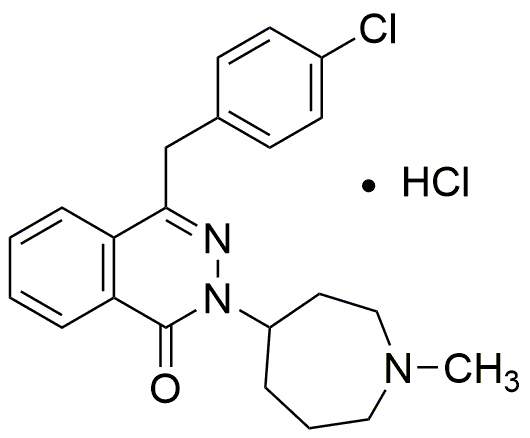Azelastine hydrochloride is widely utilized in research focused on:
- Allergy Treatment: This compound is primarily used in nasal sprays and eye drops to alleviate symptoms of allergic rhinitis and conjunctivitis, providing quick relief for patients suffering from seasonal allergies.
- Anti-Inflammatory Applications: Its anti-inflammatory properties make it beneficial in treating conditions like asthma, where inflammation plays a critical role. This can lead to improved respiratory function for patients.
- Veterinary Medicine: Azelastine hydrochloride is also applied in veterinary practices to manage allergies in pets, ensuring they receive effective treatment for their allergic reactions.
- Research in Pharmacology: Researchers use this compound to study its effects on histamine receptors, which can lead to the development of new antihistamines with fewer side effects compared to traditional options.
- Formulation Development: The compound is explored in the formulation of new drug delivery systems, enhancing the bioavailability of medications and improving patient compliance through more effective administration routes.
Informations générales
Propriétés
Sécurité et réglementation
Applications
Azelastine hydrochloride is widely utilized in research focused on:
- Allergy Treatment: This compound is primarily used in nasal sprays and eye drops to alleviate symptoms of allergic rhinitis and conjunctivitis, providing quick relief for patients suffering from seasonal allergies.
- Anti-Inflammatory Applications: Its anti-inflammatory properties make it beneficial in treating conditions like asthma, where inflammation plays a critical role. This can lead to improved respiratory function for patients.
- Veterinary Medicine: Azelastine hydrochloride is also applied in veterinary practices to manage allergies in pets, ensuring they receive effective treatment for their allergic reactions.
- Research in Pharmacology: Researchers use this compound to study its effects on histamine receptors, which can lead to the development of new antihistamines with fewer side effects compared to traditional options.
- Formulation Development: The compound is explored in the formulation of new drug delivery systems, enhancing the bioavailability of medications and improving patient compliance through more effective administration routes.
Documents
Fiches de données de sécurité (FDS)
La FDS fournit des informations de sécurité complètes sur la manipulation, le stockage et l’élimination du produit.
Spécifications du produit (PS)
Le PS fournit une description complète des propriétés du produit, notamment sa composition chimique, son état physique, sa pureté et les exigences de stockage. Il détaille également les plages de qualité acceptables et les applications prévues du produit.
Certificats d'analyse (COA)
Recherchez des certificats d'analyse (COA) en saisissant le numéro de lot du produit. Les numéros de lot et de lot se trouvent sur l'étiquette d'un produit, après les mots « Lot » ou « Lot de fabrication ».
Numéro de catalogue
Numéro de lot/série
Certificats d'origine (COO)
Ce certificat d'exploitation confirme le pays dans lequel le produit a été fabriqué, et détaille également les matériaux et composants utilisés et s'il est issu de sources naturelles, synthétiques ou autres sources spécifiques. Ce certificat peut être requis pour les douanes, le commerce et la conformité réglementaire.
Numéro de catalogue
Numéro de lot/série
Fiches de données de sécurité (FDS)
La FDS fournit des informations de sécurité complètes sur la manipulation, le stockage et l’élimination du produit.
DownloadSpécifications du produit (PS)
Le PS fournit une description complète des propriétés du produit, notamment sa composition chimique, son état physique, sa pureté et les exigences de stockage. Il détaille également les plages de qualité acceptables et les applications prévues du produit.
DownloadCertificats d'analyse (COA)
Recherchez des certificats d'analyse (COA) en saisissant le numéro de lot du produit. Les numéros de lot et de lot se trouvent sur l'étiquette d'un produit, après les mots « Lot » ou « Lot de fabrication ».
Numéro de catalogue
Numéro de lot/série
Certificats d'origine (COO)
Ce certificat d'exploitation confirme le pays dans lequel le produit a été fabriqué, et détaille également les matériaux et composants utilisés et s'il est issu de sources naturelles, synthétiques ou autres sources spécifiques. Ce certificat peut être requis pour les douanes, le commerce et la conformité réglementaire.


